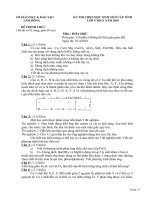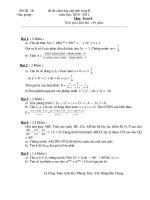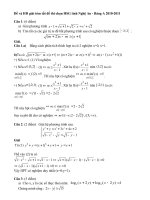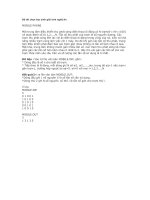DE THI HSG TINH LAM DONG 2010
Bạn đang xem bản rút gọn của tài liệu. Xem và tải ngay bản đầy đủ của tài liệu tại đây (132.79 KB, 7 trang )
ĐIỂM HỌ TÊN , CHỮ KÝ GIÁM KHẢO SỐ PHÁCH
(Do CTHĐ chấm thi
ghi)
BẰNG SỐ BẰNG CHỮ GIÁM KHẢO 1 GIÁM KHẢO 2
SECTION I: LISTENING (3 pts). HƯỚNG DẪN PHẦN THI NGHE HIỂU
• Bài nghe gồm 2 phần, mỗi phần được nghe 2 lần, mỗi lần cách nhau 30 giây.
• Mở đầu mỗi phần nghe có tín hiệu nhạc, mỗi phần cách nhau 1 phút.
• Thí sinh đọc kỹ câu hỏi và hướng dẫn trước khi làm bài.
PART 1: People are talking about New Year’s resolutions. What is each person going to do?
Listen and choose the correct answers, then write them in the numbered box.
1. A. do more exercise
B. put on weight
C. go on a diet
2. A. learn to swim
B. learn English
C. give up smoking
3. A. do more walking
B. take up jogging
C. go swimming
4. A. join a gym
B. put on weight
C. give up smoking
5. A. eat less meat
B. lose some weight
C. join a health club
6. A. take up jogging
B. swim regularly
C. start doing sit-ups
Your answers:
1. 2. 3. 4. 5. 6.
PART 2: Listen to the program. Choose the correct answers, then write them in the numbered
box.
1. Kirsten likes collecting autographs. She has …………..
A. 7,000 B. several thousand C. 70,000
2. She has been doing it ………….
A. for six years B. since she was six C. since she was 16
3. Dan likes visiting the homes of famous people. He’s been doing it …………
A. for two years B. for a short time C. since he was a child
4. He has been to ……… places
A. 300 B. 3,000 C. 300,000
5. Carlos enjoys watching movies. He’s been doing it …………..
A. since he was four B. for four years C. for 24 years
6. Carlos and his friends want to ……….
A. see Titanic 100 times. B. visit Europe C. break a world record.
Your answers:
1. 2. 3. 4. 5. 6.
1 / 7
SECTION II: LEXICO- GRAMMAR (6 pts)
PART 1: Choose the word or phrase that best completes each sentence. Write your answer (A, B,
C, or D) in the numbered box.
1. …………. Monday morning, there is a meeting …………. 11 am and 1 pm.
A. At/at B. For/at C. In/on D. On/between
2. Jim always gets very annoyed if he can’t get his own ………….
A. wish B. desire C. way D. object
3. Because of the heavy rain, my parents couldn’t see me …………. at the railway station.
A. out B. off C. up D. away
4. Modern architecture, in many ……….., is horribly ugly.
A. means B. examples C. reasons D. cases
5. After a lot of difficulty, he ………….. to open the door.
A. succeeded B. managed C. finished D. completed
6. They have made a lot of progress ………….. the country became independent.
A. for B. since C. before D. until
7. Nam : What are you going to do next year?
Ba : I wish I………….the answer to that question.
A. knew B. know C. had known D. would know
8. Sometimes advertising signs …………….down during a storm and people are injured by them.
A. blow B. are blown C. blew D. were blown
9. He always did ……………. seemed right to him.
A. which B. that C. what D. who
10. Everything seems all right, …………..?
A. doesn’t it B. isn’t it C. don’t they D. aren’t they
Your answers:
1. 2. 3. 4. 5.
6. 7. 8. 9. 10.
PART 2: Write the correct FORM of each bracketed word in the numbered space provided in
the numbered box.
‘Space Warrior’s Wrist’ is only one of the painful conditions that can be caused by (1. constant)
……….. playing computer games. Children also suffer from a strange (2. ache) ……….. feeling in
their upper arms or shoulders. Another problem that doctors have reported is a (3. lose) ……….of
appetite in some children. The (4. explain) …………for this seems to be that they don’t get enough
exercise. This may also explain the (5. tend) ………..of some children to put on weight. The high
sugar (6. contain) ………….of the convenience foods the same children eat is (7. probable) ………
also a cause. Some people believe that it is the (8. responsible) ………….of the government to do
something about this problem. However, it is difficult for even the most (9. power) ………….
government to stop people doing what they want to do. One official recently said: ‘All we can do is
put a (10. warn) …………...on the games, saying that they can harm your health.’
Your answers:
1. 2. 3. 4. 5.
6. 7. 8. 9. 10.
2 / 7
PART 3: Put each verb in the numbered brackets into a suitable verb form. Write your answers
in the numbered box.
Dear Winnie,
Thank you for your letter which I received this morning. You asked me what we (1. do) when
the landslide occurred. I (2. not remember) things too clearly now but I think I (3. watch) TV and my
sister (4. do) her homework at the time. Suddenly all the lights (5. go out) and I (6. frighten). I
remember (7. call out) to my parents, who (8. talk) quietly in the next room. The next minute we (9.
hear) a loud noise and the whole building began to shake.
It was a terrible experience and I never want (10. go) through anything like it again. We are all
safe now but we were very lucky.
Love,
Anna
Your answers:
1. 2. 3. 4. 5.
6. 7. 8. 9. 10.
SECTION III: READING (7 pts)
PART 1: Read the following passage and choose the correct answer to each of the questions.
Write your answer (A,B,C, or D) in the numbered box.
The ‘Neighbourhood Watch’ scheme all started a few years ago in the quiet village of Mollington
after a number of burglaries in the village and the surrounding area. The residents of the village came
up with the idea that they themselves could keep an eye on their neighbours’ property while they were
away on holiday. Since then, and with the support of the government and the police, more than 50,000
‘Neighbourhood Watch’ schemes have been set up all over the country.
The object of each ‘Watch’ group is to reduce the opportunities that criminals have in any particular
street or area. Each resident who is a member of the scheme agrees to call the police whenever they
see something suspicious. Everything is done calmly and decreetly – it is the police who actually
check out each report and investigate what is happening. Residents who are part of the ‘Watch’ are
not supposed to act as police or put themselves in any danger.
When a new ‘Neighbourhood Watch’ scheme is set up in an area, the first thing people notice is the
large, brightly coloured ‘Neighbourhood Watch’ sign. This is a great deterrent to most burglars and
vandals, because very few of them take a chance of breaking into someone’s house if they know that
there is a high risk of beeing seen by neighbours keeping a look-out. Burglars also know that people
who are part of ‘Neighbourhood Watch’ schemes are more likely to have fitted good locks to their
doors and windows.
There’s another benefit too. In the time since the ‘Neighbourhood Watch’ scheme came into
existence, there is growing evidence of a new community spirit. It is bringing people together as
never before, and encouraging people to care for each other. New friendships are being made, and
contact is often established with old people living on their own, who are often the most frightened and
the most at risk.
Question 1: The ‘Neighbourhood Watch’ scheme in Mollington was started ………
A. because the police could not protect people.
B. before any others in the country.
C. after 50,000 burglaries in the area.
D. because some residents wanted to go away for a holiday
Question 2: When members of a ‘Watch’ group see suspicious individuals, they ……..
A. try and frighten them away. C. try and arrest them.
B. contact the police. D. call the other members of the ‘Watch’ group.
3 / 7
Question 3: When a new ‘Watch’ scheme starts in an area, ………
A. people fit new locks to their doors and windows.
B. the police send fewer officers to the area.
C. burglars are less likely to break into houses.
D. residents put signs on their doors.
Question 4: One other benefit of ‘Watch’ schemes is that ………
A. people get to know each other better.
B. members of the ‘Watch’ look after old people.
C. different kinds of people are attracted to live in the area.
D. old people are no longer frightened of crime.
Question 5: In general, the author seems to think that ……..
A. the police should do more to protect people.
B. ‘Watch’ schemes are not very useful in reducing crime.
C. the ‘Neighbourhood Watch’ schemes have been successful.
D. it is hard to have any privacy in a ‘Neighbourhood Watch’ area.
Your answers:
1. 2. 3. 4. 5.
PART 2: Read the article about the meaning of dreams. Choose the most suitable heading from
the box (A-H) for each part of the article (1-5). There are three headings which you do not need.
Write your answers in the numbered box.
A. FIRE B. CASTLE C. DEATH D. MOUNTAINS
E. EXAMS F. WILD ANIMALS G. FLYING H. FALLING
THE MEANING OR DREAMS
We all have dreams and can often remember parts or images from them. Here is a guide to the
meanings of the most common images that appear in dreams.
1. ………..
This is one of the most common images, typically showing insecurity and anxiety. It may relate to a
fear that a career or a relationship is coming to an end. The fact that we are not hurt when we land
represents a hope that things won’t turn out too badly.
2. ………..
This common dream – which commonly involves using our own arm or leg power (rather than any
kind of engine) – seems to represent a wish to escape from the problems we are facing in everyday
life. It may also represent a wish to achieve greater power.
3. ………….
This represents strength and power. If the dreamers are inside, they are protected by the thick walls. If
they are outside and looking at it, they may desire that safety. It is also sometimes the symbol of a
woman.
4. …………..
This suggests that the dreamer has mixed feelings of love and hostility towards the person who dies,
particularly if that person is close. If dreamers see themselves die, this may represent a desire to
escape from pressure.
5. ……………
Anxiety dreams are very common when something is worrying us. We are being put to the test. The
mind remembers times in the past when we were nervous, and a common image is that of a test
for which we were badly prepared.
Your answers:
1. 2. 3. 4. 5.
4 / 7
PART 3: Fill each blank with ONE suitable word. Write your answers in the numbered box.
I was (1) ………….. up by my uncle and aunt and grew up on a small farm in the west of England. I
think it was better (2) …….... living in a city, because every day I ran about in the (3)……….. air. (4)
………….. I went to school, all I did was play on the farm all day. Both my aunt and uncle worked
with the animals, and although they worked very hard, they always (5) …………..interesting things
to me. They didn’t have much money, but they got along (6) …………..with everyone, and we didn’t
have any of the (7) …………..of living in the city. I always felt happy on the farm. There was no
noise (8) ……….. pollution, and (9)…………was really peaceful. That’s probably (10) ………… I
became a farmer when I was older.
Your answers:
1. 2. 3. 4. 5.
6. 7. 8. 9. 10.
PART 4: Read the following passage and decide which answer (A, B, C, or D) best fits each gap.
Write your answer (A, B, C, or D) in the numbered box.
Brave nurse saves pensioner from fire.
A nurse who saved a man from a burning house while on her (1) …………to work has been awarded
a medal for bravery. Sheila McDonald (2) ………… clouds of black smoke (3) ………… from a roof
of a house in Manchester. She went to investigate and quickly (4) ………… that the house was (5)
………… fire.
She knocked on the front door but there was no reply. Then she walked around the house looking in
all of the windows. (6) ………… she peered into the living- room window, she saw disabled
pensioner Graham Summers asleep in an armchair. She tapped on the window but couldn’t (7)
………… him up. So she smashed her way (8) ………… the window, lifted Mr Summers into his
wheelchair and pushed him to safety through the (9) ………… black smoke.
At the award ceremony Mr Summers was full of praise for Ms McDonald, but she said, ‘I don’t really
(10) ………… it an act of bravery – I just did what anyone would have done.’
1. A. route B. way C. passage D. path
2. A. distinguished B. detected C. remarked D. noticed
3. A. running B. pouring C. flowing D. trickling
4. A. realised B. recognised C. identified D. knew
5. A. in B. under C. on D. to
6. A. Although B. If C. Because D.When
7. A. raise B. get C. wake D. bring
8. A. into B. through C. via D. by
9. A. great B. big C. thick D. deep
10. A. view B. hold C. see D. consider
Your answers:
1. 2. 3. 4. 5.
6. 7. 8. 9. 10.
SECTION IV: WRITING (4 pts)
PART 1: Rewrite the following sentences in such a way that they have the same meaning as the
original ones.
1. It was so late that nothing could be done.
It was too……………………………………………………………………………………….…
5 / 7









